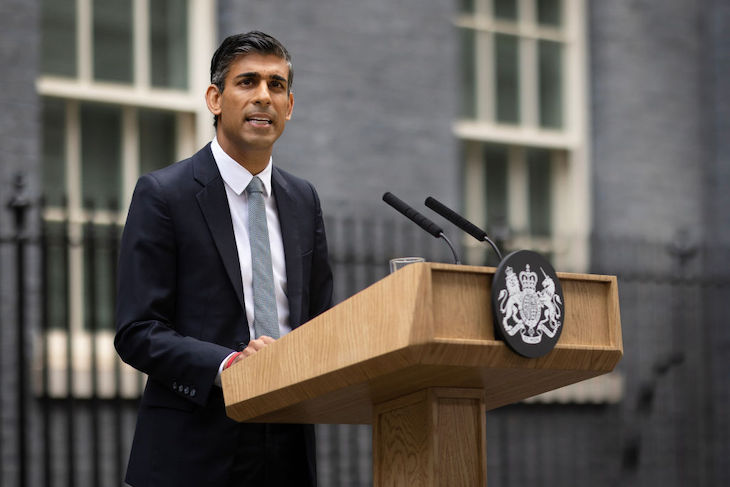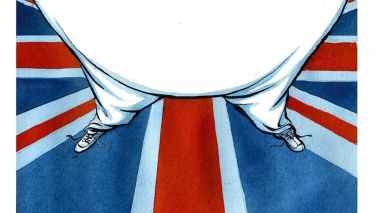Vote for me or you’ll end up with Keir Starmer. That was the threat from Rishi Sunak on Monday evening when in front of the GB News cameras he addressed voters in Country Durham.
The Prime Minister warned that the general election will be a straightforward choice between the Conservatives and Labour. He then listed what was at stake: controlling spending, cutting taxes, boosting the economy, protecting borders and policing the streets. ‘All of those things that you care about, who is more likely to deliver them?’
Not the Tories, if the polls are to be believed. One poll last month predicted the party will be ‘wiped out’ in the next election, on a scale not seen since 1997.
It seems that the Conservatives last tactic is a scare one, trying to persuade their disaffected supporters not to jump ship to the Reform party. ‘A vote for anyone who is not us is a vote for him,’ said Sunak, referring to Starmer and the prospect of his leading Labour to victory.
A similar tactic was deployed by the Tories’ French cousins, the Republicans, in the lead up to the 2022 presidential election. They had elected Valerie Pécresse as their candidate, a nomination I described at the time as a catastrophic mistake. She and Emmanuel Macron were two of a kind and in the very unlikely event the pair reached the second round run-off I wrote that ‘all the electorate will need to decide is whether they want a centrist in a suit or one in a blouse.’
Within weeks of Pécresse’s nomination, her campaign was in disarray and her team were reduced to warning the party faithful that a vote for either Eric Zemmour or Marine Le Pen would be ‘useless’. Her campaign director, Geoffroy Didier, declared: ‘This is the eighth time that a Le Pen has stood for president. If the French had wanted one, we’d know!’
Didier’s doom-mongering fell on deaf ears. Pécresse received 1.6 million votes, nearly a million fewer than Zemmour and 6.5 million shy of Le Pen’s total. So unpopular was Pécresse with voters, she failed to win even 5 per cent of the vote, meaning the State didn’t reimburse her campaign costs and she had to launch a fund-raising appeal.
While it was true that Zemmour’s campaign didn’t live up to early expectations, his nascent Reconquest still outperformed the Republicans, the party which under different names had dominated the Fifth Republic.
Similarly, while Marine Le Pen added another failure to the family name, she took nearly 25 per cent of the vote in the first round of voting.
When her father, Jean-Marie, first stood as a presidential candidate, representing the National Front in 1974, which he had founded two years earlier, his share of the vote was 0.75 per cent (190,000 ballots).
In the decades that followed Le Pen’s popularity grew; in the 1988 election he received 4.3 million votes and in 2002 he got enough support to reach the second round run-off at the expense of the Socialist party.
Although Le Pen was crushed by Jacques Chirac in that head to head, the party’s popularity continued to grow in the 21st Century. Voters overlooked Le Pen’s conviction for minimising the Holocaust and his derogatory remarks about Arabs, but listened to what he said about deindustrialisation, mass immigration and the loss of sovereignty to the EU.
But the great single factor in the rise of the National Front was that the centre-right Republicans and the centre-left Socialists became indistinguishable. They stopped listening to the concerns of their grassroots supporters, particularly those in the provinces, and because obsessed with middle-class metropolitan issues.
This centrist consensus created a vacuum into which moved the Le Pens, as well as the Eurosceptic Jean-Luc Melenchon, who quit the Socialists to form a more authentic left-wing movement.
In the 2022 election Le Pen and Melenchon polled 16 million votes between them in the first round; Pécresse and Anne Hidalgo, the Socialists’ centrist candidate, scraped 2.2 million in total.
Pécresse was abandoned by Republican centrists, who voted for Macron, and also the right-wing element, who cast their ballots for either Zemmour or Le Pen.
Might a similar fate befall the Tories? It was reported this week that the Liberal Democrats have identified ‘Waitrose Women’ as a demographic that might be lured from the Conservatives to their camp. These are middle-aged and middle-class centrists, part of the southern blue wall, who listen to the BBC and are members of the National Trust.
The northern red wall, in places like Country Durham, who ‘loaned’ the Tories their vote in 2019, are predicted to vote either for Reform or to stay at home.
This is why the Tories could experience an electoral wipe-out at the general election, similar to the one suffered by the Republicans in 2022.
Since that humiliation, the Republicans have tried to reconnect with their rank and file but the damage has been done. They have been let down too many times: by Nicolas Sarkozy, Francois Fillon and Valerie Pécresse.
Poll after poll is predicting that Le Pen’s National Rally will crush the opposition in June’s European elections; the latest has them on 31 points, 12 more than Macron’s Renaissance and 24 more than the Republicans, who languish in sixth place.
The Republican candidate for the Europeans is a true conservative, the erudite Francois-Xavier Bellamy. Only 38, he is a vehement critic of mass immigration and an enemy of the EU elite, but he is making no headway in the polls. He is paying for the sins of his party.
For the right leaning voters who once backed the Republicans, their sense of betrayal is so visceral they will never return to the party.
How the anger of Tory voters plays out will be one of the political stories of 2024, and tomorrow’s by-elections in Kingswood and Wellingborough will be an indicator. The Reform party have two strong candidates in Rupert Lowe and Ben Habib, both of whom are genuine conservatives.
Will they poll more votes than the Tories? A voter scorned, is a voter lost. Ask the Republicans.
In February 2012 they boasted the President of France and 313 MPs; Marine Le Pen hadn’t one MP to her name. Twelve years later, the Republicans have 62 seats in parliament and Le Pen 88.







Comments